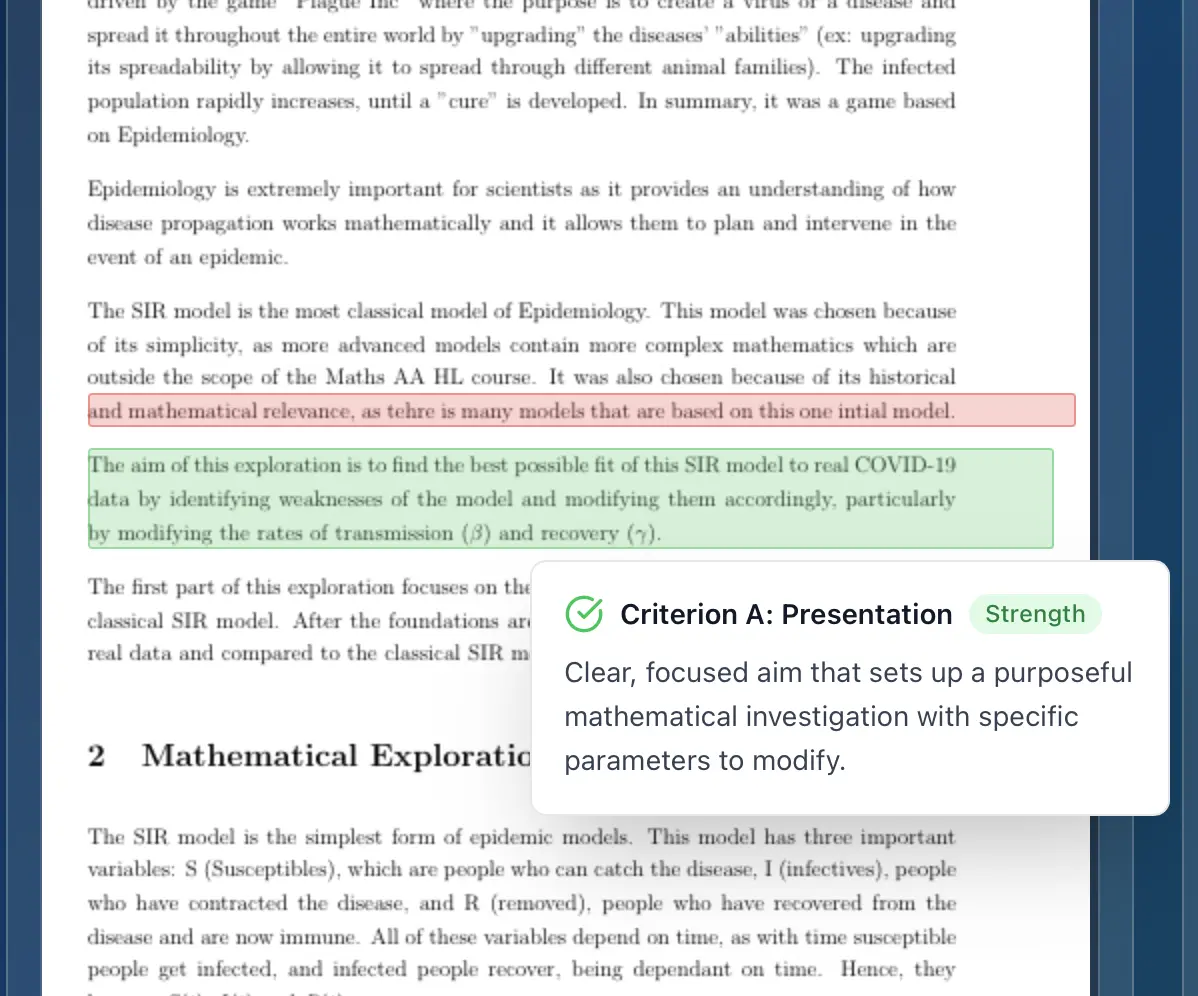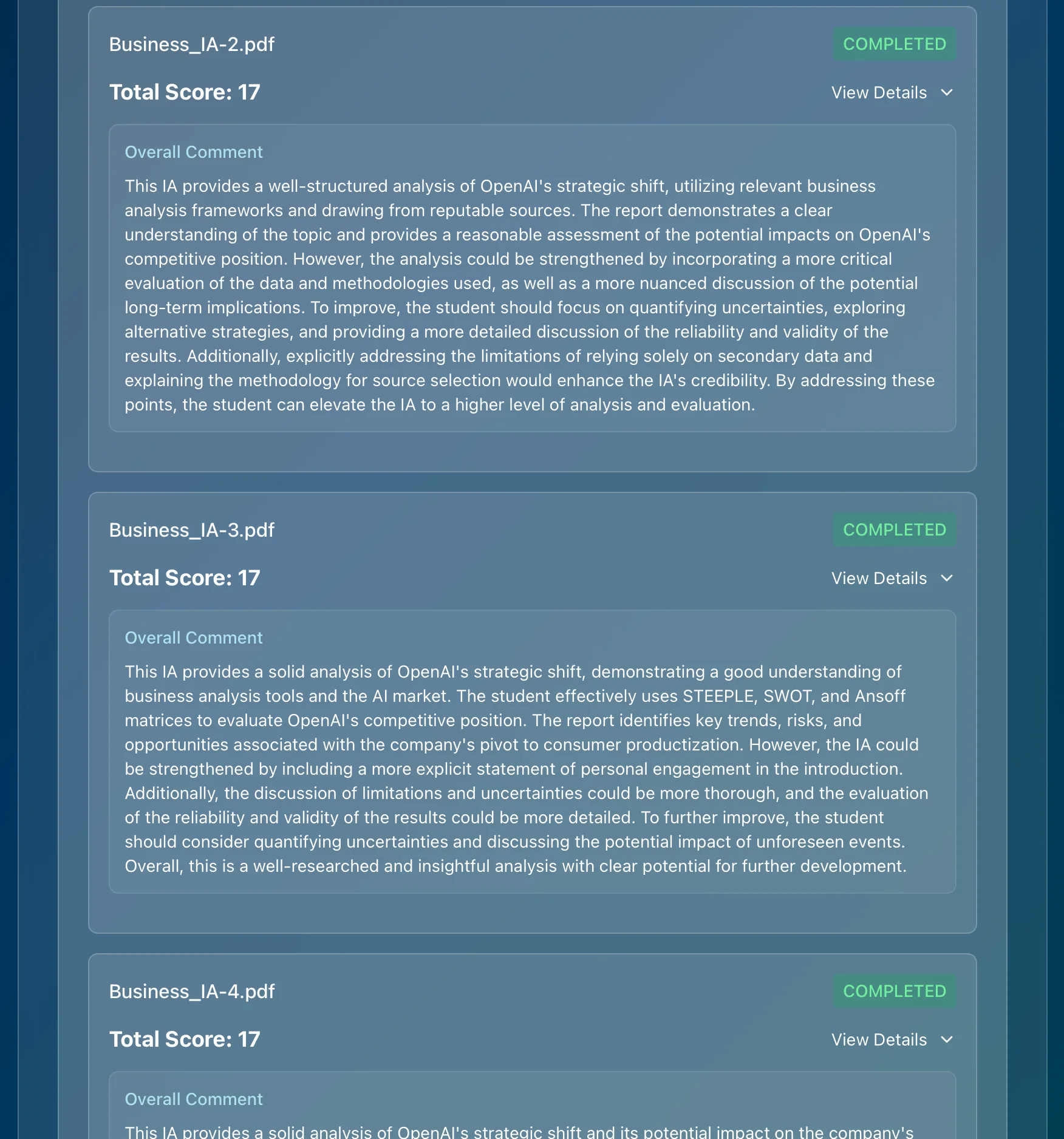Mastering the Psychology Extended Essay: A Comprehensive Guide to IB Grading Criteria
Are you an IB Psychology student struggling to understand the Extended Essay grading criteria? This comprehensive guide breaks down each criterion, offering clear explanations, practical tips, and actionable advice to help you achieve top marks. We'll explore the specific requirements of each section, focusing on how to meet the IB standards for your psychology extended essay.
What is the Psychology Extended Essay?
The Psychology Extended Essay is an independent research project undertaken by IB Diploma Programme students. It allows you to delve deeply into a specific area of psychology, conduct research, and present your findings in a well-structured and academically rigorous essay. This essay is a significant component of your IB assessment and provides an opportunity to demonstrate your understanding of psychological concepts and research methods.
Struggling with IB Assessments?
Get instant, detailed feedback on your work with AI that understands IB criteria.

Understanding the Grading Criteria
The IB Psychology Extended Essay is assessed against five criteria: Focus and Method, Knowledge and Understanding, Critical Thinking, Presentation, and Engagement. Each criterion is weighted differently, contributing to the overall grade. Understanding these criteria is crucial for planning, conducting, and writing your essay effectively. Let's dive into each one.
Detailed Breakdown of Psychology Extended Essay Criteria
Criterion A: Focus and Method (0-6 marks)
What it assesses: This criterion evaluates the clarity and relevance of your chosen topic, the precision of your research question, the appropriateness and justification of your methodology, and the quality of your secondary sources.
Mark bands:
- 0 Marks: The topic is unclear, the research question is missing or irrelevant, and the methodology is not described.
- 1-2 Marks: The topic is stated, but lacks context. The research question is broad or poorly defined. The methodology is vaguely described or inappropriate.
- 3-4 Marks: The topic is clearly stated with some context. The research question is focused but may lack precision. The methodology is described and partially justified. Relevant sources are used.
- 5-6 Marks: The topic is clearly stated with academic context and justification. The research question is precise, focused, and can be fully addressed. The methodology is thoroughly described and justified, demonstrating an understanding of its limitations. Appropriate psychological journals and books are used, with explicit references to the research question.
Tips for success:
- Choose a focused topic: Avoid overly broad topics. A narrow, well-defined topic allows for deeper exploration.
- Craft a precise research question: Your research question should be clear, specific, and answerable through research. For example, instead of "Does social media affect mental health?", try "To what extent does exposure to idealized body images on Instagram contribute to body dissatisfaction among adolescent females aged 15-18?".
- Justify your methodology: Explain why you chose your specific research methods (e.g., literature review, meta-analysis). Discuss the strengths and limitations of your approach.
- Use credible sources: Rely on peer-reviewed journals, academic books, and reputable websites.
- Common mistakes to avoid:
- Selecting a topic that is too broad or vague.
- Failing to clearly define the research question.
- Using unreliable or non-academic sources.
- Not justifying the chosen methodology.
Criterion B: Knowledge and Understanding (0-6 marks)
What it assesses: This criterion assesses the depth of your understanding of relevant psychological concepts, theories, and studies related to your research question.
Mark bands:
- 0 Marks: Little to no understanding of relevant psychological concepts is demonstrated. Terminology is absent or misused.
- 1-2 Marks: Basic understanding of some psychological concepts is demonstrated. Terminology is used, but application is limited or inaccurate.
- 3-4 Marks: Clear understanding of relevant psychological concepts, theories, and studies is demonstrated. Terminology is used appropriately. Some consideration of influential factors (e.g., culture, ethics) is present.
- 5-6 Marks: Thorough understanding of relevant psychological concepts, theories, and studies is demonstrated through effective communication and appropriate academic style. Psychological research methods and terminology are applied accurately and confidently. Considered evaluation of evidence and findings from empirical studies, considering factors such as culture, ethics, gender, and methodology, informs the interpretation of the research question.
Tips for success:
- Demonstrate in-depth knowledge: Go beyond simply stating facts. Explain the underlying principles and implications of psychological concepts and theories.
- Use appropriate terminology: Employ psychological terms accurately and consistently.
- Consider influential factors: Discuss how factors like culture, ethics, gender, and methodology might influence your findings.
- Common mistakes to avoid:
- Demonstrating only a superficial understanding of psychological concepts.
- Misusing psychological terminology.
- Failing to consider the influence of cultural, ethical, or methodological factors.
Criterion C: Critical Thinking (0-12 marks)
What it assesses: This criterion assesses your ability to analyze, evaluate, and discuss different perspectives or approaches to your research question. It is the most heavily weighted criterion.
Mark bands:
- 0 Marks: No analysis or evaluation is present. Arguments are absent or irrelevant.
- 1-3 Marks: Limited analysis and evaluation. Arguments are weak or unsupported. The essay is primarily descriptive.
- 4-6 Marks: Some analysis and evaluation of different perspectives are present. Arguments are supported by some evidence. The essay demonstrates some critical thinking.
- 7-9 Marks: Effective analysis and evaluation of different perspectives are present. Arguments are supported by relevant psychological theory and data sources. The essay demonstrates a critical and analytical approach. Strengths and weaknesses of the investigation are discussed.
- 10-12 Marks: Insightful analysis and evaluation of different perspectives are present. Arguments are backed by a thorough consideration of the research material's merits and limitations. The student showcases the ability to extract knowledge from selected sources, analyze it, and employ it to formulate arguments and draw conclusions relevant to the research question. Discussions consistently revolve around ideas or concepts in line with the research question. Awareness of possible researcher and methodological biases is demonstrated.
Tips for success:
- Analyze and evaluate: Don't just summarize information. Critically analyze the strengths and weaknesses of different theories, studies, and perspectives.
- Support your arguments: Back up your claims with evidence from credible sources.
- Discuss limitations: Acknowledge the limitations of your research and the studies you cite.
- Consider alternative perspectives: Explore different viewpoints and explain why you favor one over another.
- Demonstrate awareness of bias: Discuss potential researcher and methodological biases that might influence your findings.
- Common mistakes to avoid:
- Primarily describing information without analyzing or evaluating it.
- Making unsupported claims.
- Ignoring the limitations of your research.
- Failing to consider alternative perspectives.
Criterion D: Presentation (0-4 marks)
What it assesses: This criterion assesses the structure, layout, referencing, and overall presentation of your extended essay.
Mark bands:
- 0 Marks: The essay lacks structure and organization. Referencing is absent or inaccurate.
- 1 Mark: The essay has some structure, but it is not always clear. Referencing is attempted but contains errors.
- 2-3 Marks: The essay is generally well-structured with a clear introduction, body, and conclusion. Referencing is mostly accurate and consistent. Sections and subsections are used with informative headings.
- 4 Marks: The essay begins with a title page and a table of contents, adhering to standard formatting conventions. The structure of the essay follows the expected conventions for the topic, ensuring clarity and coherence in the presentation of arguments. Sections and subsections have informative headings that contribute to the overall organization of the essay without distracting from the main argument. Graphs, figures, or tables are appropriately labeled with numbers and brief descriptions and maintain good graphical quality.
Tips for success:
- Follow a clear structure: Organize your essay with a clear introduction, body paragraphs, and conclusion.
- Use informative headings and subheadings: Guide the reader through your argument with well-defined sections.
- Reference accurately and consistently: Use a consistent referencing style (e.g., APA, MLA) and ensure all sources are properly cited.
- Include a title page and table of contents: Follow standard formatting conventions.
- Common mistakes to avoid:
- Failing to structure the essay logically.
- Using inconsistent or inaccurate referencing.
- Omitting a title page or table of contents.
- Using poorly formatted graphs or tables.
Criterion E: Engagement (0-6 marks)
What it assesses: This criterion assesses your engagement with the research process, as demonstrated in the Reflections on Planning and Progress Form (RPPF).
Mark bands:
- 0 Marks: The RPPF is missing or provides minimal information.
- 1-2 Marks: The RPPF provides some information about the research process, but lacks depth and reflection.
- 3-4 Marks: The RPPF showcases the individual's progress and active involvement in the writing process. The student outlines some skills acquired during the extended essay writing journey.
- 5-6 Marks: The RPPF form showcases the individual's progress and active involvement in the writing process. The student outlines the skills acquired during the extended essay writing journey. Challenges faced during the process are described in detail, along with the strategies employed to address them. The document reflects the personal significance and relevance of the work undertaken.
Tips for success:
- Complete the RPPF thoroughly: Provide detailed information about your research process, challenges, and reflections.
- Reflect on your learning: Discuss the skills you developed and the insights you gained during the research process.
- Be honest about challenges: Acknowledge any difficulties you encountered and explain how you overcame them.
- Demonstrate personal engagement: Show your passion for the topic and your commitment to the research process.
- Common mistakes to avoid:
- Submitting an incomplete or superficial RPPF.
- Failing to reflect on your learning and challenges.
- Presenting a generic or unenthusiastic account of the research process.
How to Excel in Your Psychology Extended Essay
- Start early: Begin planning and researching your essay well in advance of the deadline.
- Choose a topic you are passionate about: Your enthusiasm will make the research process more enjoyable and lead to a more engaging essay.
- Seek feedback: Ask your teacher, peers, or mentors to review your work and provide constructive criticism.
- Revise and edit carefully: Proofread your essay thoroughly to eliminate errors in grammar, spelling, and punctuation.
- Stay organized: Keep track of your sources, notes, and drafts to avoid confusion and ensure accuracy.
- Manage your time effectively: Set realistic goals and deadlines for each stage of the research and writing process.
Pro Tip: Get AI-Powered Grading
Stop second-guessing your grades. Get instant feedback aligned with official IB rubrics.

Common Mistakes to Avoid
- Plagiarism: Always cite your sources properly to avoid plagiarism.
- Lack of focus: Ensure your essay stays focused on your research question.
- Superficial analysis: Go beyond simply summarizing information; analyze and evaluate it critically.
- Poor organization: Structure your essay logically and use clear headings and subheadings.
- Inadequate referencing: Use a consistent referencing style and ensure all sources are properly cited.
- Procrastination: Avoid leaving the essay to the last minute.
The Role of AI in Modern Assessment
Modern technology is revolutionizing how we approach academic assessment. AI-powered grading assistants can now help teachers maintain consistency and accuracy in their evaluations while saving valuable time. These tools use the same official IB criteria to provide detailed feedback and scoring, ensuring that assessments meet the high standards expected in IB programs.
For educators looking to streamline their grading process while maintaining the quality and consistency that IB assessments demand, AI grading assistance offers a powerful solution that complements traditional teaching methods.
Conclusion
By understanding and applying the IB Psychology Extended Essay grading criteria, you can significantly improve your chances of achieving a high score. Remember to choose a focused topic, conduct thorough research, analyze and evaluate your findings critically, and present your work in a clear and organized manner. Good luck!
Looking for more support with IB assessment grading? Discover how AI-powered grading assistants can help maintain consistency and accuracy in your evaluations while saving valuable time. Learn more about modern grading solutions designed specifically for IB educators.